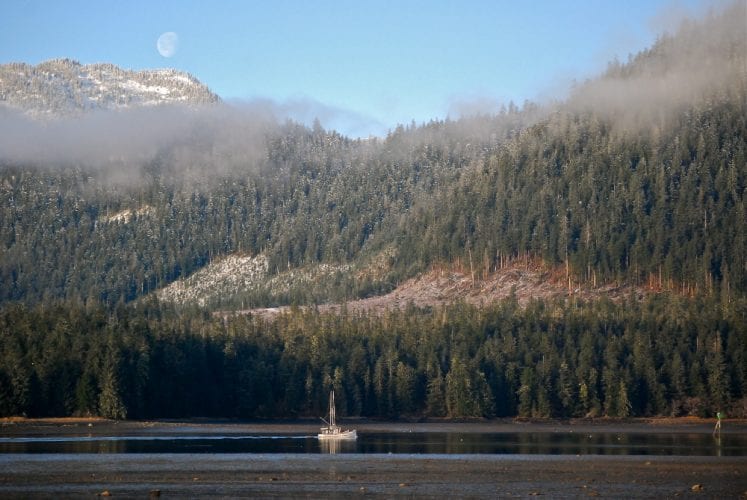
The moon sets above logged areas on Kupreanof Island and a fishing boat heading north in the Wrangell Narrows near Petersburg in 2009. (Photo courtesy of Cindi Lagoudakis)
Petersburg’s borough assembly Tuesday didn’t have enough votes to pass a resolution seeking the repeal of the roadless rule on the Tongass National Forest. The assembly voted on the contentious issue because the regional economic development organization Southeast Conference will be addressing it next month.
The Petersburg borough’s first draft resolution of the new year dealt with an issue that’s been around since the Clinton Administration. It voiced support for repeal of 2001 roadless rule, which with some exceptions, prohibits logging and new road building on nearly 60 million acres of undeveloped forest across the country, including parts of Alaska’s Tongass and Chugach National Forests. A draft appropriations bill for the Interior Department introduced in the fall by Alaska Senator Lisa Murkowski seeks to end the rule on the Tongass and Chugach.
Mayor Mark Jensen clarified that the issue would be up for a vote at a mid-session summit of the Southeast Conference in February. Former mayor and Petersburg’s Southeast Conference representative Cindi Lagoudakis asked for the current assembly’s opinion on it so she could represent that at the regional meeting.
“Why I will be voting for this is this encumbers, ties the hands, makes it more expensive I guess you could call it, for development of hydro projects if you have to build a road, access to mines,” Jensen told the assembly.
The rule allows clearing trees for electrical transmission lines and allows construction of new roads paid for with federal highway money. A judge has also ruled that specific mining and hydro-electric power plant projects on the Tongass could proceed even with the rule in place. The government also has leeway to approve other development and has approved tree cutting for mine access on the Tongass. So far the rule has withstood court challenges. The state of Alaska is appealing a court ruling from last September that let the rule stand. The Southeast Alaska Power Agency, which Petersburg helped form, has signed on as a friend to that appeal from the state.
Alaska’s congressional delegation has introduced legislation in the past to repeal the protection but haven’t yet been successful in passing that change.
Some members of the public spoke out in favor of repealing the forest land protection. Steve Burrell cited a lost connection this winter to Prince Rupert on the state ferry system. “We need to be able to build roads in Southeast Alaska,” Burrell said. “The Bradfield Canal Road, no one’s looked at that in years. To be able to get in and out of the middle of Southeast, when the ferry system goes down, which it could, we have no way in and out of here, unless you go on the barge, put your rig on the barge.”
But the assembly heard from others who wanted the forest protection to remain.
“99 percent of us are forest dependent but this is never reflected in Southeast Conference’s positions or supported by our delegation,” said Joan Kautzer. “I hope this council will stand up for fishing, subsistence and tourism and vote this resolution down.”
And some on the assembly were convinced to vote against the repeal resolution, including Jeigh Stanton Gregor. “The roadless rule has a lot of flaws to it,”Stanton Gregor said. “It isn’t a perfect rule by any stretch but I think one thing it’s done really well is protect fishermen and their livelihoods. It is really good for salmon.”
The resolution failed on a split 3-3 vote with Jeff Meucci and Kurt Wohlhueter joining Stanton Gregor in voting no. The assembly last spring also voted against a bill by Congressman Don Young to transfer National Forest Land to states.











